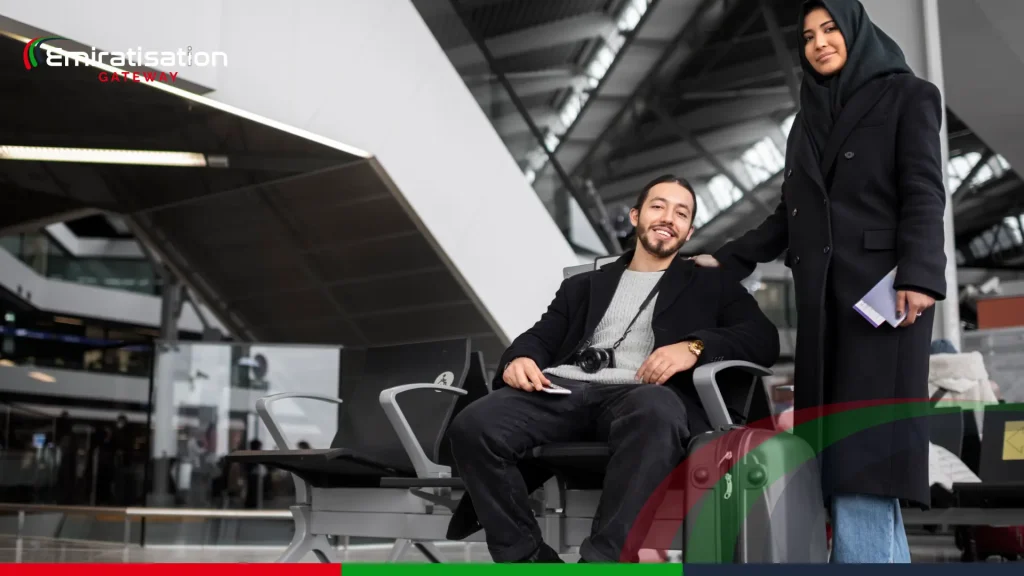The Emiratisation is the new focus of the government. Promoting the local citizen’s talent with their local sector, the government makes it mandatory for every company to ensure hiring. All of them are required to prove a certain percentage of Emirati employees in their working staff.
The UAE government is putting a lot of effort into giving Emiratis additional jobs. They are providing companies with incentives to hire locals, as well as support and training programs. Building a robust economy where everyone has an opportunity to flourish is the main goal. How else is government contributing to this powerful plan is discussed in this article.
How is the Government Promoting Emiratisation?
A major component of the UAE’s economic and social development is emiratization. It strongly depends on the government’s proactive participation. An environment that is favorable to increased employment opportunities for Emiratis is largely created by the government through the implementation of strategic policies and initiatives.
For the UAE, emiratization is strategically necessary for a number of reasons:
- A strong Emirati middle class promotes social stability and cohesion; encouraging Emiratization strengthens national identity and pride.
- Emirati employees play their roles in bringing innovation within organizations. This increases the nation’s competitiveness.
- UAE can decrease the reliability on expatriate labor and diversify its economy by increasing Emirati participation in the workforce.
- A highly proficient Emirati workforce improves the UAE’s reputation as a global business hub.
- Maintaining a skilled and motivated Emirati workforce is essential for the country’s long-term economic and social prosperity.
Government Policies and Initiatives:
The government took various prominent steps to fuel the spirit of Emiratisation. These initiatives single handedly improve the scope of emiratisation in both private and public sector.
- Quota System: It is mandatory to fulfill the pre-determined Emiratization quotas. It requires companies to employ a specific percentage of Emirati nationals.
- Financial Incentives: The government offers financial incentives to employers who hire and retain Emirati employees, such as wage subsidies and tax breaks.
- Training and Development: There are significant investments that are made for the training and development programs to equip Emiratis with the skills required for the job market.
- Job Placement Services: Government agencies provide job placement services to connect Emirati job seekers with suitable opportunities.
- Entrepreneurship Support: Entrepreneurship is promoted through various initiatives including creating job opportunities and improving economic growth.
- Public Sector Leadership: The government official entities create milestone by employing a high percentage of Emiratis in the public sector.
- National Service: Mandatory national service programs encourage young Emiratis to various sectors, improving their employability.

Incentives for Businesses:
Strategic tools like incentives are employed within organizations to drive particular actions or behaviors. They are intended to promote performance, creativity, and employee happiness and can take the form of financial or non-financial rewards.
Monetary Rewards:
Along with salary, additional rewards are given including bonuses that are performance-based reward. There comes a commission that is generated in calculation of sales. The profit sharing given by the company is allocated among the staff. The shares are offered at low cost.
Non-Potential Rewards:
Other than money, awards and recognition are also being done. This includes a public announcement of the good performance. The chances to advance professionally or acquire new skills. There also comes compressed workweeks, flexible hours, and remote work. Extra days off for sick leave, vacation, or personal use. Moreover, Fitness and health-related initiatives to enhance workers’ well-being.
Training and Development Programs:
Organizations must implement training and development initiatives. This helps them stay in the highly competitive environment of today. Businesses may increase productivity, improve morale among staff members, and promote a continuous learning culture. This can be fueled by making investments in employee development.
Different Training Program Types:
Depending on the needs of the organization and the industry, training programs can differ greatly.
These are a few typical kinds:
- Onboarding: Introducing new hires to the job responsibilities, company culture, and policies.
- Technical Skills Training: Acquiring specialized abilities necessary for performing job duties, like operating equipment or being proficient with software.
- Soft Skills Training: Improving collaboration, leadership, and communication abilities.
- Management and Leadership Development: Providing strategic thinking, decision-making, and people management training to staff members in order to prepare them for managerial positions.
- Compliance Training: Making sure staff members are aware of and follow moral and legal obligations.
- Customer Service Training: Enhancing how staff members deal with clients.
- Sales Training: Giving sales teams the tools they need to close deals and produce leads.
Partnerships with Educational Institutions:
Bringing forth the emiratisation requires strong partnership between the government, private sector, and educational institutions. Universities and colleges play a pivotal role in preparing Emirati graduates for the workforce.
They align academic programs with industry needs. By working closely with educational institutions, the UAE can create a pipeline of skilled Emirati talent. Those who are ready to contribute to the nation’s economic growth.
- Curriculum Development: Aligning university curricula with the demands of the job market to ensure graduates possess relevant skills.
- Internships and Co-op Programs: Providing practical work experience for students to bridge the gap between academia and industry.
- Career Guidance and Counseling: Offering career counseling to students to help them make informed career choices.
- Mentorship Programs: Pairing students with industry professionals to provide guidance and support.
- Joint Research Projects: Collaborating on research initiatives to address industry challenges and develop innovative solutions.
- Talent Acquisition: Facilitating recruitment of Emirati graduates through campus placements and job fairs.
- Continuing Education: Offering professional development programs for working professionals to enhance their skills.
Monitoring and Enforcement:
Effective monitoring and enforcement are the pillars for the success of Emiratization. The UAE government conducts regular inspections to ensure compliance with Emiratization quotas. Penalties are imposed on businesses that fail to meet their goals. The government also collects and analyzes employment data to identify trends and areas for improvement.
Partnership with the private sector works hard for effective monitoring, and public awareness campaigns. These are important to bring forth understanding and support for Emiratization.
Public Awareness Campaigns:
Campaigns to raise public awareness are crucial to creating an atmosphere that is favorable to emiratization. The UAE government has put in place a number of programs to inform and involve the public. Breaking stereotypes by showcasing the abilities and accomplishments of Emirati professionals, they outline how Emiratization advances the stability. it gives a further clear view of growth of the national economy.
They motivate people to embrace emiratization as a duty to their country. Making use of online channels to interact with the public and reach a large audience. Working together with well-known personalities to spread messages about emiratization. Planning gatherings and seminars to interact with the general public on a local level.
Support for Small and Medium Enterprises (SMEs):
SMEs play a vital role in advancing Emiratization and are the backbone of many economies. The UAE government has put in place a number of assistance initiatives to promote SME involvement in Emiratization:
Monetary Rewards:
- Subsidies: Paying part of the salary of Emirati workers with wage subsidies.
- Tax Breaks: SMEs that reach emiratization goals will have their corporate taxes lowered.
- Soft Loans: Low-interest loans given to SMEs so they can hire and train Emirati employees.
Education and Training:
- Programs for Skill Development: Providing specialized instruction to give Emiratis the know-how required for SME positions.
- Mentorship Programs: To help Emirati workers advance their careers, experienced mentors are paired with them.
- Opportunities for Internships: Setting up programs to introduce Emirati students to the SME world.
Administrative Support:
- Streamlined Procedures: Improving the efficiency of administrative procedures to help SMEs recruit and hire Emirati workers.
- Regulatory Flexibility: To promote Emiratization initiatives, regulations for SMEs can be loosened.
- Finance: To support Emirati hiring, SMEs should have easier access to financing options.
Choices for Procurement:
- Government Contracts: Giving preference to SMEs for government contracts that have a solid track record of emiratization.
- Development of Local Supply Chains: Assisting SMEs in this process will increase the number of jobs available to Emiratis.
The UAE government promises to promotes an environment where small and medium-sized enterprises (SMEs) can prosper and contribute to the country’s Emiratization objectives by providing a comprehensive package of support.
Technology and Innovation in Emiratisation
Emiratization initiatives are changing due to technology. The United Arab Emirates is simplifying the process of matching job seekers. This aligns with the appropriate opportunities by practical implementation of digital platforms. In order to pinpoint skill shortages and guide the creation of policies to fill them, advanced analytics is being used. Additionally, virtual training gives Emirati workers more access to educational opportunities.
Automation may result in job losses, but it also creates new opportunities for Emirati talent to fill. The UAE’s emphasis on innovation hubs encourages Emiratis to start their own businesses and create jobs. Emiratization is poised for long-term success thanks to this deliberate use of technology, which also sets up the United Arab Emirates for future economic expansion.

Challenges and Solutions:
Any initiative comes with its own drawbacks and risk that needs to be addressed for the streamline approach. However, we have come up with all the solutions that will simplify the process for each company or employer.
Challenges:
The following challenges can be encountered on your way forward. Each aspect is important and cannot be ignored.
- Skill Gap: A discrepancy between job seekers’ abilities in Emirati and what employers are looking for.
- Drawing Emiratis to the Private Sector: Job security and remuneration are frequently more desirable in the public sector.
- Retention: Because of things like job satisfaction and opportunities for professional advancement, it can be challenging to keep Emirati employees on board.
- Limitations of the Quota System: Strict quotas can impede business adaptability and may not always result in the best recruitment of talent.
- Economic Downturns: As firms prioritize cost-cutting, economic difficulties may have an impact on Emiratization initiatives.
- Cultural Factors: looking for gender based equality and fulfilling societal norms, can be a big challenge for emirati women.
- Bridging the Skill Gap: investing in focused training schemes like internship help matching the skillset of emirati individuals.
- Increasing attraction of Private Sector: introducing flexible work schedules and opportunities for career progression, and competitive compensation packages in the private sector.
- Establishing a Supportive Work Environment: Boosting a working environment that value the talent of Emirati talent while giving them chances of progress.
- Modular Emiratization Objectives: Adopt a more nuanced quota system that takes company size and industry-specific requirements into account.
- Economic Advancement: Highly skilled jobs obtained by Emiratis makes the econmy to depend less on oil.
- Empowering Emirati Women: Put in place laws that encourage women to work, like flexible work schedules and childcare subsidies.
- Talent Retention Strategies: Competitive pay and a perfect balance to keep Emirati talent, provide competitive pay, chances for professional advancement, and work-life balance programs.
Solutions:
- Invest in targeted training programs, internships, and apprenticeships to align Emirati skills with job market demands.
- Offer competitive compensation packages, career advancement opportunities, and flexible work arrangements in the private sector.
- Create inclusive workplaces that value Emirati talent and provide opportunities for growth.
- Implement a more nuanced approach to quotas, considering industry-specific needs and company size.
- Reduce reliance on oil by promoting knowledge-based industries, creating higher-skilled jobs for Emiratis.
- Implement policies that support women’s participation in the workforce, such as childcare subsidies and flexible work arrangements.
- Offer competitive compensation, career development opportunities, and work-life balance initiatives to retain Emirati talent.
Future of Emiratisation:
Emiratization’s future calls for a more advanced strategy. The UAE wants to strategically place Emiratis in roles that are in line with their skills and career aspirations, moving away from just numerical targets. Continuous investment in training and development will be necessary to close skill gaps and get the Emirati workforce ready for new challenges.
To establish a sustainable Emiratization ecosystem, public-private sector partnerships must be strengthened. To accomplish these aims, it will also be essential to use technology to improve hiring, training, and performance management.
Conclusion:
Emiratization initiatives have been directed in large part by the UAE government. The government has made it easier for companies to give priority to hiring Emiratis. It occurs by putting in place financial incentives, implementing strategic policies, and making investments in human capital development.
But the road to complete Emiratization is still long, and the government’s role is still very important. Sustained backing, inventiveness, and flexibility are imperative in tackling new obstacles and guaranteeing the initiative’s sustained prosperity. Through the development of a knowledgeable and capable labor force. The government can make a substantial contribution to the country’s sustainable economic growth and diversification.
FAQs
Q1. Are there specific quotas for Emiratisation in the private sector?
Yes, companies must meet minimum Emirati employment percentages based on size and industry.
Q2. How is the UAE government promoting Emiratisation?
Through policies, quotas, financial incentives, training programs, and initiatives like Nafis.
Q3. What benefits do companies get for hiring Emiratis?
They receive support like salary subsidies, training funds, and government incentives.
Q4. Are there penalties for non-compliance with Emiratisation rules?
Yes, companies may face fines, downgrading, or restrictions for failing to meet quotas.
Q5. What sectors are targeted for Emiratisation?
Mainly private sector industries such as banking, insurance, and retail.






